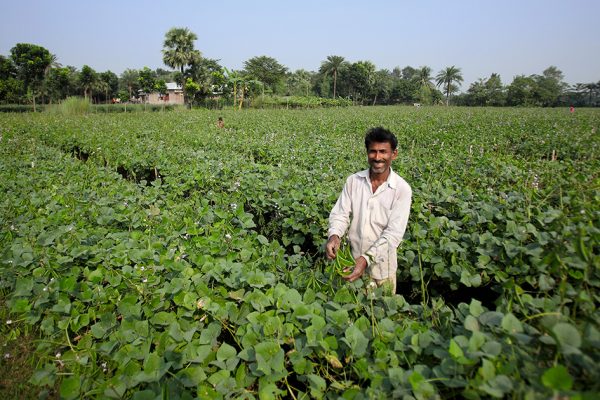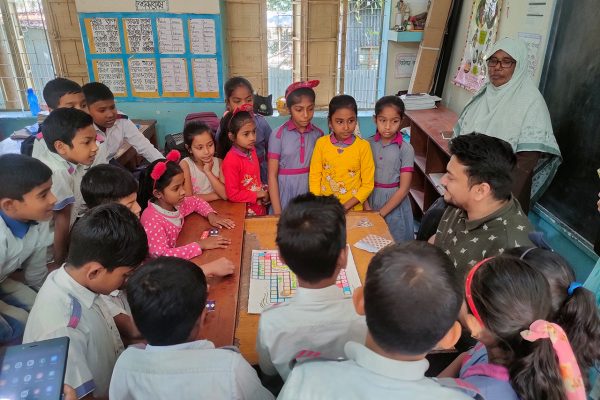It takes a woman to raise a village
Reading Time: 6 minutes
This blog post is an abridged version of a case study featured in Problem or Promise: Harnessing Youth Potential in Uganda, recently published by BRAC and The MasterCard Foundation.
This blog post is an abridged version of a case study featured in Problem or Promise: Harnessing Youth Potential in Uganda, recently published by BRAC and The MasterCard Foundation.
At six in the morning, shortly before the sun rises, 21-year-old Judith Mugula rises early to wake “her babies,” feed them, and prepare them for school. She lives with her two sisters, her twin brothers (still in school), her son, and nieces and nephews in Iganga, Uganda.
After her brother recently died, his nine-year-old daughter was sent to live with her. Now, in addition to her niece’s living costs and school fees, she has also had to take on a full-time helper in the household that she pays 15,000 Ugandan shillings a month (about $5.70 at today’s rate) on top of her food costs.
Once everyone is off to school, Judith begins the long walk across town to her grocery shop, a good half-hour’s walk away from her house, where the rent is cheaper and there are more customers. Although the shop opens at 6 a.m., her mother, who sleeps there overnight to protect against thieves, looks after it before she arrives. The shop is open seven days a week from 6 a.m. until 10 p.m., an exhausting schedule, but one which is imperative in running a successful business. As Judith explains, if you are shut one day, customers will not come back the next.
The variety of goods on sale is considerable, ranging from staple products such as rice, beans, wheat, four, sugar, maize, peanuts, potatoes, fresh vegetables, eggs and cooking oil, to cold drinks, cigarettes, sweets, snacks, toiletries and cleaning products, socks and underwear and household goods such as pots, pans and padlocks. The most popular item in the shop is a small bag of cold borehole water, selling at 100 shillings ($.05) a piece.
Although her predominantly poor customers are purchasing small quantities of low value items – many, for example, come to select only one or two tomatoes – the regularity of her customers throughout the day means that by the end of the day, the shop has brought in a high take.
When she tells me she has 3.5 million shillings ($2,034) invested in the shop, I can’t resist wondering how a young woman of Judith’s age, from a poor background, and with a large number of dependents to look after, has built a business this size.
The story of her success starts back several years.
When she was just 16, Judith was living with her uncle, and when he gave her money for household expenditures she would save some when possible, and added to this the money she sometimes received as support from her boyfriend. She accumulated 70,000 shillings ($38) in capital and chose to start a clothing business, since it required a relatively small amount of capital to start.
A year later, in 2007, one of her neighbors told Judith about a club starting near her house, called Empowerment and Livelihoods for Adolescents (ELA), and registered her as a member.
Through the ELA club, Judith received financial literacy training that gave her the skills and knowledge to keep accounts and run her business more smoothly. She was also trained in hair plaiting, which enabled her to earn some extra income. She cannot give this a lot of time because she has to concentrate on her other businesses, but can earn around 9,000 shillings ($5) a month plaiting the hair of three children she knows, contributing this money to school fees.
After some time as an ELA member, she received a loan for 150,000 ($85) shillings from the club, which she invested in expanding her clothes business.
In 2008, she decided to start her grocery shop. She was tired of moving around in the sun and wanted to start a shop so she could be stationed in one place. Given the high rent for the shop, 700,000 shillings ($407) per year, and the capital she needed to stock the shop, she first used savings from her clothing business to buy some baby goats. After rearing the goats she later sold most of them, along with one of her mother’s cows, to pay the shop rent.
Even as Judith finished repaying the first ELA club loan a while ago and recently finished repaying a second ELA club loan of 400,000 shillings ($232), access to capital is not the most important asset Judith gained from the club. Through club membership she has learned what it is like to work together, rather than having to “go it alone.” That, she says, has been even more critical to her than the finance.
She recognizes that not all members have joined for the same reason – some want to play games, others want to focus on business – but for those with a business mindset and who are forced to support themselves and their families, they learn hugely important things from each other. They discuss with each other how best someone can survive and support their families, how best they can sustain their businesses, and how to live well with others without conflict. As well as drawing on her fellow ELA members for social and emotional support, their friendship has also been crucial in her economic success.
“The worst thing you can do is think that you know best and just start a business,” she explains emphatically. “It’s vital that you share your idea with other people before you start.”
Group membership has given her a platform to discuss these issues and learn from her peers who have had similar experiences. She has also drawn upon support and guidance from her mother, who used to run a food business. When she fell ill, Judith looked after it for her, giving her experience in running a business.
Although Judith’s father is alive, her parents separated when she was younger because her father did not want to support his children’s school fees. If it were not for Judith’s uncle, who brought them to Iganga and sponsored her through Primary 7, she would have had to drop out of school earlier. As a result of his help, she could stay in school until Secondary 3, when she became pregnant and had to drop out. This difficult family background has driven her to work hard for her success.
“The misery I have been through since childhood made me think about being hard-working from an early age,” she explains. “Because I didn’t want to be miserable my whole life, and knew I would have to work hard to attain a good life.”
She doesn’t want her son and other children that she supports to experience similar hardship, and dreams of being able to send them to boarding school in the next three or four years so that they do not have to walk so far to school.
“It’s by no means easy,” explains Judith. “And success doesn’t come overnight, but after a couple of years of such hard work, you can start to see progress.”
As the day goes on, Judith’s generosity becomes more and more striking. Her shop means that she is the sole provider of the household and supports a large number of people. Although all of her brothers and sisters from her mother’s side are here, she also has some from her paternal side in the village. She doesn’t support them on a regular basis, but when they come to ask her for money and she has it, she will give it to them. “How can I not give if I have?” she asks.
While Judith’s shop continues to grow, it has so far made little impact on her struggles given that her priority is to keep investing in the business for its future growth, and that as she becomes more successful, more people come to her for help. Perhaps equally admirable is the fact that she recounts these facts without so much of a complaint: the hardships she faces balancing the interests of her business at the same time as meeting commitments of school fees and household costs are more inherent in what she doesn’t say than what she does say.
In 2010 she was able to buy a plot of land using two years of savings from her business, and she dreams to one day build a house there. Ideally, she would like to have her shop attached to her house, but she is aware that with the extra responsibilities she has taken on with her brother’s death she has not been able to progress with these plans, and has had difficulties maintaining her savings. Tired though she is from her hard work and the pressures she faces, she is confident for the future seeing the job security that the shop offers given her continued investment in it. There is no ‘end goal’ for her shop, as such, given that she wants it to keep expanding. But through this process she has three main achievements for the next five years, including building her house and starting a business for her mother.
“But what about your third dream?” I ask, after she names these.
A smile spreads across her face as she names the one thing that she, herself, aspires to on an individual level. “I’d like to drive and own a car too!” she laughs.
Read more and download the full Uganda Youth Watch report, Problem or Promise: Harnessing Youth Potential in Uganda, published by BRAC and The MasterCard Foundation.






